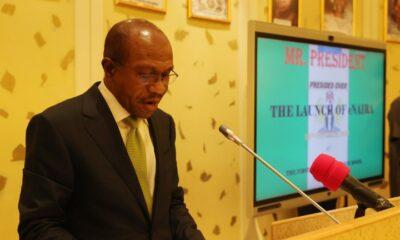- FG’s Preference for Borrowing Slashed Savings Bonds by 50% – CBN
The Federal Government of Nigeria’s savings bonds reduced by 50.18 per cent at the end of the 2018 financial year.
According to a report by the Central Bank of Nigeria on its 2018 activities, “a total of N3.59bn was allotted during the review period, indicating a decline of N3.61bn or 50.18 per cent when compared with N7.20bn at the end of December 2017.
“The decrease was attributable to a fewer number of successful bids and FGN’s preference for foreign borrowing in the period under review.
“The new issues were for two and three years and the coupon rate applied ranged from 9.48 to 12.40 per cent and 10.48 to 13.40 for the two and three years, respectively.”
The range of coupon rates in 2017 was higher, between 11.74 to 13.82 per cent and 12.74 to 14.82 for the two and three years respectively.
Consequently, the total value of FGN savings bonds outstanding at the end of December 2018 was N10.75bn.
The CBN stated that there was no new issue of FGN green bond in the review period.
Consequently, it added that the total value outstanding at the end of December 2018 remained at N10.69bn, same as reported in 2017.
The bank said a N100bn seven-year Sukuk was issued and allotted during the review period.
The Sukuk had a rental rate of 15.74 per cent payable semi-annually.
Consequently, the total value of Sukuk outstanding at the end of December 2018 increased to N200bn, representing a 100 per cent increase from N100bn in 2017.
It stated that the Over-the-Counter transactions for Nigerian Treasury bills amounted to N72.122tn, indicating an increase of N11,801.93bn or 19.57 per cent over N60,320.6bn recorded in 2017.
The development was attributable largely to increased transactions by foreign and other institutional investors.
It also stated that during the review period, the OTC transactions in FGN bonds amounted to N11.8tn, indicating an increase of N1.96bn or 19.97 per cent over N9.836tn recorded in 2017.
The trend was traceable to the active participation of investors, both local and foreign.
According to the CBN report, financial market conditions were influenced largely by global economic and political developments in 2018.
On the economic front, the interest rate hikes in the United States indicated that normalisation of monetary policy was more rapid than initially anticipated.
The impact of these rate hikes largely weakened the currency, bond and equity market of emerging economies.
The US-China trade war continues to exert strains on both economic and political grounds, further increasing the uncertainties in the global financial markets.
In view of these developments, reinforced by country-specific factors of tightening financial conditions, higher oil import bills and geo-political tensions, global growth projection was downgraded to 3.7 per cent from an earlier projection of 3.9 per cent.



 Naira4 weeks ago
Naira4 weeks ago




 Naira4 weeks ago
Naira4 weeks ago




 Naira4 weeks ago
Naira4 weeks ago




 Naira3 weeks ago
Naira3 weeks ago
 Commodities4 weeks ago
Commodities4 weeks ago


 News4 weeks ago
News4 weeks ago
 Travel4 weeks ago
Travel4 weeks ago




 Naira3 weeks ago
Naira3 weeks ago


















